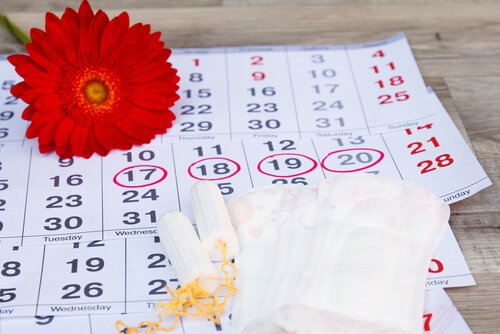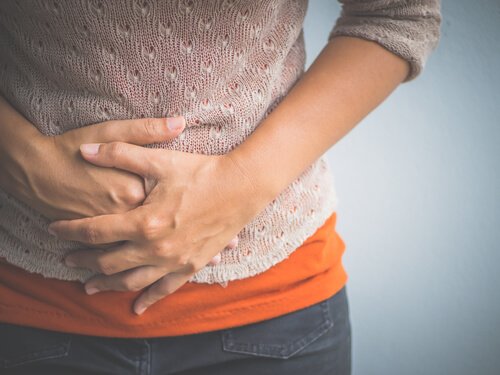Menstrual Cycle Phases: Psychological Characteristics


Written and verified by the psychologist Gema Sánchez Cuevas
Women menstruate every month. The changes a woman experiences during her menstrual cycle are part of a natural phenomenon that has four different phases.
Menstruation is the best-known phase due to its characteristics and the advertising surrounding it. However, there are also three other phases: the follicular phase, the ovulation phase, and the luteal phase. In this article, we’re going to take a closer look at each of them.
You need to remember that the menstrual cycle is an organic process. Therefore, knowing more about it will allow you to identify more bodily signs and interpret them better.

Phases of the menstrual cycle
There are four menstrual cycle phases. In each phase, certain hormones and neurotransmitters are produced. By measuring this production, we can describe quite accurately what happens during each of them.
The menstrual cycle begins on the first day of a woman’s period and ends one day before the next one. It lasts between 21 and 35 days.
It’s impossible to prevent the hormonal changes from impacting your emotions. Hormones affect the brain’s chemical balance and, therefore, your mood.
Menstruation phase
The menstrual cycle phases affect women’s emotions and behaviors during that time of the month. For example, during menstruation, there’s a drop in estrogen, a hormone that affects the excitability of the nervous system. Furthermore, it increases the levels of some neurotransmitters, such as enkephalins, endorphins, and serotonin.
When estrogen levels decrease, the levels of these neurotransmitters also decrease. These are the same neurotransmitters that make us feel good. In addition, the estrogenic decrease causes estradiol levels, a hormone that influences sexual appetite, to fall. Likewise, there are also lower progesterone levels, a hormone that affects nervous tension and irritability.
With this in mind, you could take advantage of this phase in order to focus on yourself. This is a period that favors introspection. Thus, activities such as writing tend to be more fluid. It’s also a good time to make decisions that require a lot of analysis and calm.
Follicular phase
The first phase of the menstrual cycle is the follicular phase. Its duration varies from woman to woman. Additionally, it also depends on the growth of the ovarian follicles. When the first day of the period arrives, it ends with the cultivation of the egg. In this stage, the body produces luteinizing and follicle-stimulating hormones, which leads to the production of estrogen.
The amount of estrogen increases progressively during this stage. On a biological level, this means there will be an increase in neurotransmitters such as enkephalins, endorphins, and serotonin. Around the eleventh day, areas associated with the reward system activate.
Whatever happens on a biological level is reflected on a psychological level. In this phase, feelings of happiness and sexual desire increase. Likewise, strength and energy also increase with the rise of estradiol.
This phase is a unique opportunity to undertake projects. Thanks to the activation of the reward system, this is a phase that encourages you to plan and achieve goals. During this time, it’s more likely that you’ll feel like your hard work pays off.
Ovulatory phase
The ovulatory phase is the next of the menstrual cycle phases. When the egg ends its maturation process, the pituitary gland produces an increase in luteinizing hormones, which are responsible for ovulation. The egg can be fertilized by sperm for a period of 12 to 36 hours. If there is fertilization, it will lead to pregnancy and if there isn’t, it will lead to the next month’s menstruation.
What’s the process? In this phase, estrogen levels increase and enzymes are produced to allow the degradation of follicular tissue. This causes the maturation of the egg to end and then be released. In this phase, there’s an increase in sexual desire and energy, thanks to the increase of estrogen as well as the influence of oxytocin and serotonin. Furthermore, it’s a favorable period for procreation, because it’s the moment where women have a greater chance of becoming pregnant.
To take advantage of this phase, you can look at procreation in a different way. For example, you could put all your energy into being creative. This will help you with projects where you need to flow. Additionally, you could also share and give love to those who need you. Thus, you could progress in your goals and empathize with others.
Luteal phase
The last phase of the menstrual cycle is the luteal phase. After ovulating, the corpus luteum detaches. This is a structure inside the ovaries that contains the developing egg. If it hasn’t been implanted, the corpus luteum stops producing progesterone. Thus, the lining of the uterus will shed during the next period.
One week before menstruation, estrogen and progesterone levels decrease. Premenstrual syndrome usually manifests during this time, which leads to symptoms such as:
- Sadness.
- Irritability.
- Less concentration.
- Anxiety.
- Bad mood.
- Back pain.
- Headache.
- Less sleep.
- Abdominal pain.
- Cravings.
- Diarrhea or constipation.

It can be problematic if the symptoms are more severe. On the other hand, premenstrual dysphoric disorder may also manifest. Studies on the number of incidences show that 3% to 8% of women suffer from it.
A study by Uriel Halbreich et al published in the journal Psychoneuroendocrinology revealed that this disorder severely affects patients’ quality of life.
Despite the avalanche of emotions
Despite the avalanche of emotions, you can take advantage of this stage. How? It’s a time to let go of all the burdens you’re carrying. A great idea is to express your thoughts and feelings. This will make you feel less tense. So, it’s a great opportunity to let go of whatever is harming you.
See your menstrual cycle as an opportunity to connect with yourself and get in touch with your body and mind. For example, you could turn the follicular phase into a period of reflection and decision. The ovulatory phase could be a moment of expression. The luteal phase should be a liberating moment. Lastly, the menstrual phase could be a period of emotional growth.
Each of the menstrual cycle phases manifest themselves through your body and mind. Being aware of them will help you know more about yourself.
Women menstruate every month. The changes a woman experiences during her menstrual cycle are part of a natural phenomenon that has four different phases.
Menstruation is the best-known phase due to its characteristics and the advertising surrounding it. However, there are also three other phases: the follicular phase, the ovulation phase, and the luteal phase. In this article, we’re going to take a closer look at each of them.
You need to remember that the menstrual cycle is an organic process. Therefore, knowing more about it will allow you to identify more bodily signs and interpret them better.

Phases of the menstrual cycle
There are four menstrual cycle phases. In each phase, certain hormones and neurotransmitters are produced. By measuring this production, we can describe quite accurately what happens during each of them.
The menstrual cycle begins on the first day of a woman’s period and ends one day before the next one. It lasts between 21 and 35 days.
It’s impossible to prevent the hormonal changes from impacting your emotions. Hormones affect the brain’s chemical balance and, therefore, your mood.
Menstruation phase
The menstrual cycle phases affect women’s emotions and behaviors during that time of the month. For example, during menstruation, there’s a drop in estrogen, a hormone that affects the excitability of the nervous system. Furthermore, it increases the levels of some neurotransmitters, such as enkephalins, endorphins, and serotonin.
When estrogen levels decrease, the levels of these neurotransmitters also decrease. These are the same neurotransmitters that make us feel good. In addition, the estrogenic decrease causes estradiol levels, a hormone that influences sexual appetite, to fall. Likewise, there are also lower progesterone levels, a hormone that affects nervous tension and irritability.
With this in mind, you could take advantage of this phase in order to focus on yourself. This is a period that favors introspection. Thus, activities such as writing tend to be more fluid. It’s also a good time to make decisions that require a lot of analysis and calm.
Follicular phase
The first phase of the menstrual cycle is the follicular phase. Its duration varies from woman to woman. Additionally, it also depends on the growth of the ovarian follicles. When the first day of the period arrives, it ends with the cultivation of the egg. In this stage, the body produces luteinizing and follicle-stimulating hormones, which leads to the production of estrogen.
The amount of estrogen increases progressively during this stage. On a biological level, this means there will be an increase in neurotransmitters such as enkephalins, endorphins, and serotonin. Around the eleventh day, areas associated with the reward system activate.
Whatever happens on a biological level is reflected on a psychological level. In this phase, feelings of happiness and sexual desire increase. Likewise, strength and energy also increase with the rise of estradiol.
This phase is a unique opportunity to undertake projects. Thanks to the activation of the reward system, this is a phase that encourages you to plan and achieve goals. During this time, it’s more likely that you’ll feel like your hard work pays off.
Ovulatory phase
The ovulatory phase is the next of the menstrual cycle phases. When the egg ends its maturation process, the pituitary gland produces an increase in luteinizing hormones, which are responsible for ovulation. The egg can be fertilized by sperm for a period of 12 to 36 hours. If there is fertilization, it will lead to pregnancy and if there isn’t, it will lead to the next month’s menstruation.
What’s the process? In this phase, estrogen levels increase and enzymes are produced to allow the degradation of follicular tissue. This causes the maturation of the egg to end and then be released. In this phase, there’s an increase in sexual desire and energy, thanks to the increase of estrogen as well as the influence of oxytocin and serotonin. Furthermore, it’s a favorable period for procreation, because it’s the moment where women have a greater chance of becoming pregnant.
To take advantage of this phase, you can look at procreation in a different way. For example, you could put all your energy into being creative. This will help you with projects where you need to flow. Additionally, you could also share and give love to those who need you. Thus, you could progress in your goals and empathize with others.
Luteal phase
The last phase of the menstrual cycle is the luteal phase. After ovulating, the corpus luteum detaches. This is a structure inside the ovaries that contains the developing egg. If it hasn’t been implanted, the corpus luteum stops producing progesterone. Thus, the lining of the uterus will shed during the next period.
One week before menstruation, estrogen and progesterone levels decrease. Premenstrual syndrome usually manifests during this time, which leads to symptoms such as:
- Sadness.
- Irritability.
- Less concentration.
- Anxiety.
- Bad mood.
- Back pain.
- Headache.
- Less sleep.
- Abdominal pain.
- Cravings.
- Diarrhea or constipation.

It can be problematic if the symptoms are more severe. On the other hand, premenstrual dysphoric disorder may also manifest. Studies on the number of incidences show that 3% to 8% of women suffer from it.
A study by Uriel Halbreich et al published in the journal Psychoneuroendocrinology revealed that this disorder severely affects patients’ quality of life.
Despite the avalanche of emotions
Despite the avalanche of emotions, you can take advantage of this stage. How? It’s a time to let go of all the burdens you’re carrying. A great idea is to express your thoughts and feelings. This will make you feel less tense. So, it’s a great opportunity to let go of whatever is harming you.
See your menstrual cycle as an opportunity to connect with yourself and get in touch with your body and mind. For example, you could turn the follicular phase into a period of reflection and decision. The ovulatory phase could be a moment of expression. The luteal phase should be a liberating moment. Lastly, the menstrual phase could be a period of emotional growth.
Each of the menstrual cycle phases manifest themselves through your body and mind. Being aware of them will help you know more about yourself.
All cited sources were thoroughly reviewed by our team to ensure their quality, reliability, currency, and validity. The bibliography of this article was considered reliable and of academic or scientific accuracy.
- Halbreich, U., Borenstein, J., Pearlstein, T., & Kahn, L. S. (2003). The prevalence, impairment, impact, and burden of premenstrual dysphoric disorder (PMS/PMDD) Psychoneuroendrocrinology, 28, 1-23.
- Guyton, A.C., & Vela H. (1969). Fisiología Humana (Vol. 1). Interamericana: España.
- Gray, Miranda., & Steinbrun, N. (2007). Luna Roja: los dones del ciclo menstrual. Gaia Ediciones.
This text is provided for informational purposes only and does not replace consultation with a professional. If in doubt, consult your specialist.







